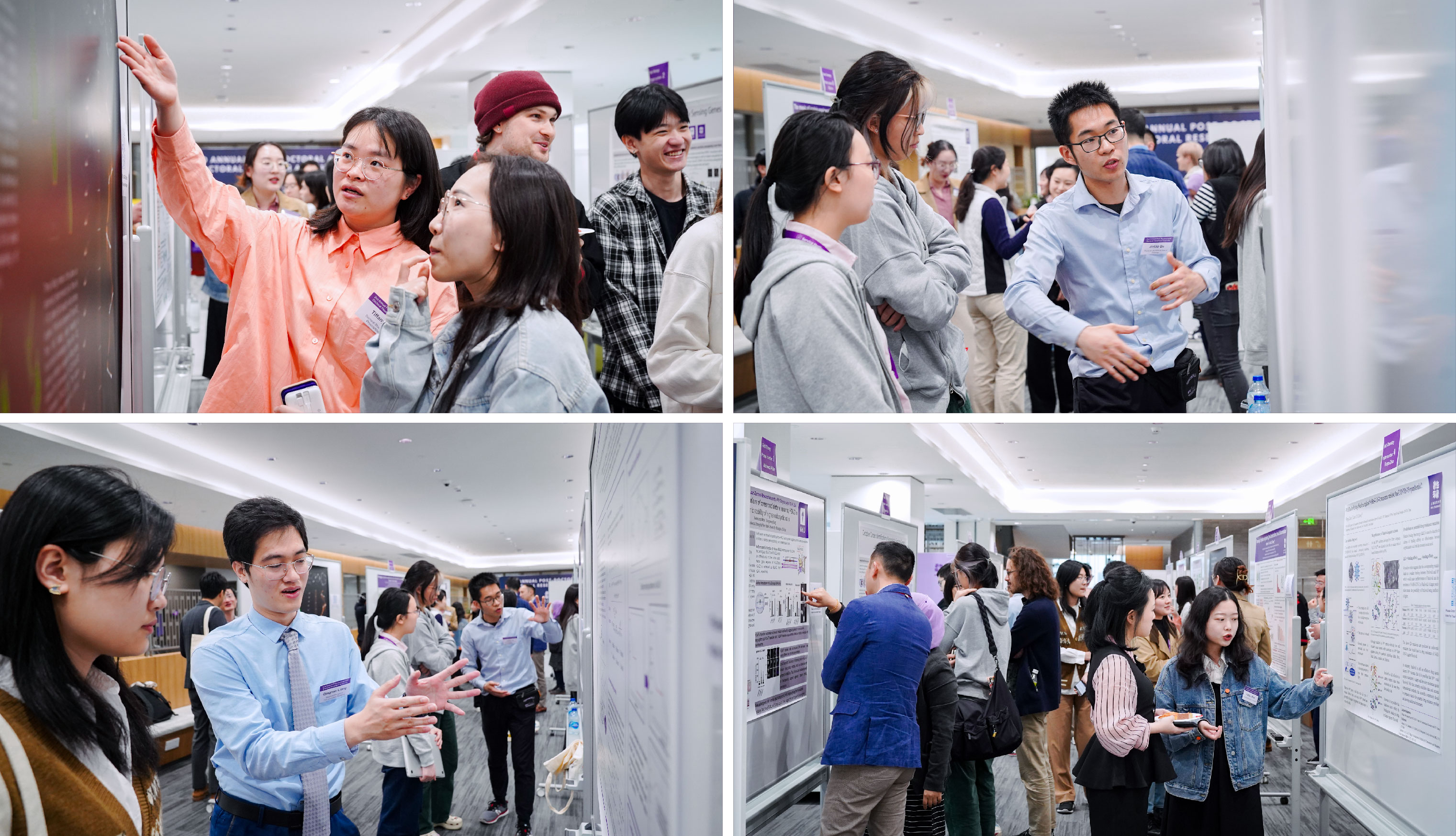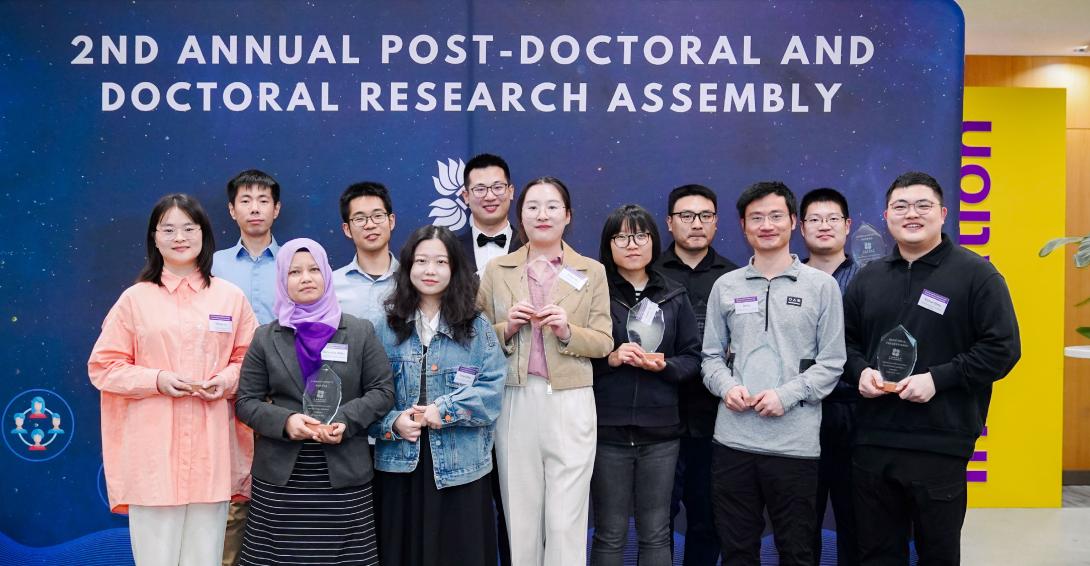NYU Shanghai hosted its second annual Postdoctoral and Doctoral Research Assembly, hosted by the Office of Graduate and Advanced Education (OGAE) on April 18-19. The two-day assembly highlighted the research works of two postdoctoral fellows and 18 PhD students across a variety of disciplines including biology, chemistry, computer science, data science, neural science, physics, sociology, transportation systems, and urban studies.
Student research was showcased in a poster exhibition and plenary sessions of oral presentations. Each oral presentation was four minutes, followed by an additional four minutes to answer questions posed by a panel of faculty judges.
Judges determined Best Oral Presentation awardees and a large public audience making up all members of NYU Shanghai’s community voted for Audience Favorite Posters.
Dean of Graduate and Advanced Education Eric Mao, who oversees NYU Shanghai’s master’s and doctoral programs, said the presentations were a testament to the academic rigor at the university. “I commend all the participants for their outstanding works presented, each one the product of years of intellectual inquiry questing after answers toward critical research questions,” Mao said. “They gained valuable practice in talking to audiences of specialists and non-specialists alike, and shined a light on the contributions of NYU Shanghai’s young scholar community,”
Poster Exhibition

Post doctoral fellow Mahmuda Akter shared her work on the “Functional specifications of conserved histone variants, H2A.Z to keep genomic stability of higher eukaryotic cells.” Her research, which touches on roles of chromosomal proteins, could lead to understanding solutions for tumor suppression.
Akter said presenting her research helped her grow as a researcher. “I received some interesting questions which made me think differently about my research,” she said. “I also felt excited when a person outside of my discipline of study satisfactorily understood my research.”
Assistant Professor of Biology Jungseog Kang, Akter’s advisor,said he’s excited for Akter to continue researching the H2AZ histone.“Her study will increase knowledge in the field and eventually provide an effective tool to stop tumors resulting from abnormal H2AZ histone,” he said..
Li Zhi, a doctoral student in Transportation Systems shared his research on “On the Value of Orderly Electric Vehicle Charging in Carbon Emission Reduction,” which addresses the issue of carbon emissions derived from charging electric vehicles. Analyzing 3,777 battery electric vehicles (BEVs) over an 11-month period, Li’s team found that BEVs produced nearly 1.2 tons of carbon emissions. As a solution, Li suggests the implementation of schedules, which could potentially reduce those emissions by up to 39%.
Doctoral student Li Huilin shared her research at the intersection of mathematics and physics on “Optical effects from free falling plates in fluid,” which seeks to explain certain optical phenomena caused by snowflakes, providing further insights into the way snowflakes fall.
Oral Presentations

Xie Zhiye, a computer science doctoral student, presented his research on “Tight Time-Space Tradeoffs for the Decisional Diffie-Hellman Problem,” which offers suggestions for ensuring secure communication and the protection of data privacy online.
Xie said being recognized for his work by the judges and audience was fulfilling. “It makes me more confident about my future research,” he said, adding the experience helped him practice his presentation skills. “It's a great rehearsal for my upcoming conference talk.”
One of the judges, Professor of Practice in Computer Science Wilson Tam said he was impressed by Xie’s work. “Xie Zhiye's presentation provided an accessible overview of a complex cryptographic system, a topic often daunting for non-specialists,” he said. “Through graphical illustrations, he effectively conveyed the research problem's intricacies, making it more tangible and comprehensible.
Urban Studies doctoral student Zhou Yichun presented his research on the “Classification of urban parks through visitation patterns using mobile phone data in Tokyo,” which found that a nuanced park management strategy could support the advancement of green infrastructure planning and policy. The research team’s findings provide further insights into strategic park utility which could ensure parks remain a place for all to enjoy.
Sociology doctoral student Li Zhi presented his work on the “Perceived structural holes and reputational power in organization,” which expands upon American sociologist Ronald Stuart Burt’s research on structural holes in organizations, which are defined as “a gap between two individuals with complementary resources or information.” Li’s presentation made suggestions for future research.
Read on for the full list of this year’s 2nd Annual Postdoctoral and Doctoral Research Assembly awardees.
The list of Best Oral Presentation winners is as follows:
Biology: Lyu Xiaoai, “Identification of Aneuploidy Sensing Genes.”
Chemistry: Zhao Fanyu, “Will Paxlovid stay effective against SARS-CoV-2 mutants amidst the COVID-19 pandemic?”
Computer Science: Xie Zhiye, “DL = DDH”
Neural Science: Hank Zhang, “The Brain as a Resource-Efficient Computer”
Sociology: Li Zhi, “Perceived structural holes and reputational power in organizations”
Urban Studies: Zhou Yichun, “Classification of urban parks through visitation patterns using mobile phone data in Tokyo”
The list of Audience Favorite Posters is as follows:
Biology: Mahmuda Akter, “Functional specifications of conserved histone variants, H2A.Z to keep genomic stability of higher eukaryotic cells”
Neural Science: Gu Jintao, “Beyond neural competition, decision made via feedback”
Chemistry: Hu Shiyu, “The magic of protein engineering: less dimerization, less inflammation”
Physics/Math: Li Huilin “Optical effects from free falling plates in fluid”
Computer Science: Chen Tianyao, “Logic-Assisted Language Model on Music”
Transportation Systems: Li Zhi “On the Value of Orderly Electric Vehicle Charging in Carbon Emission Reduction”


